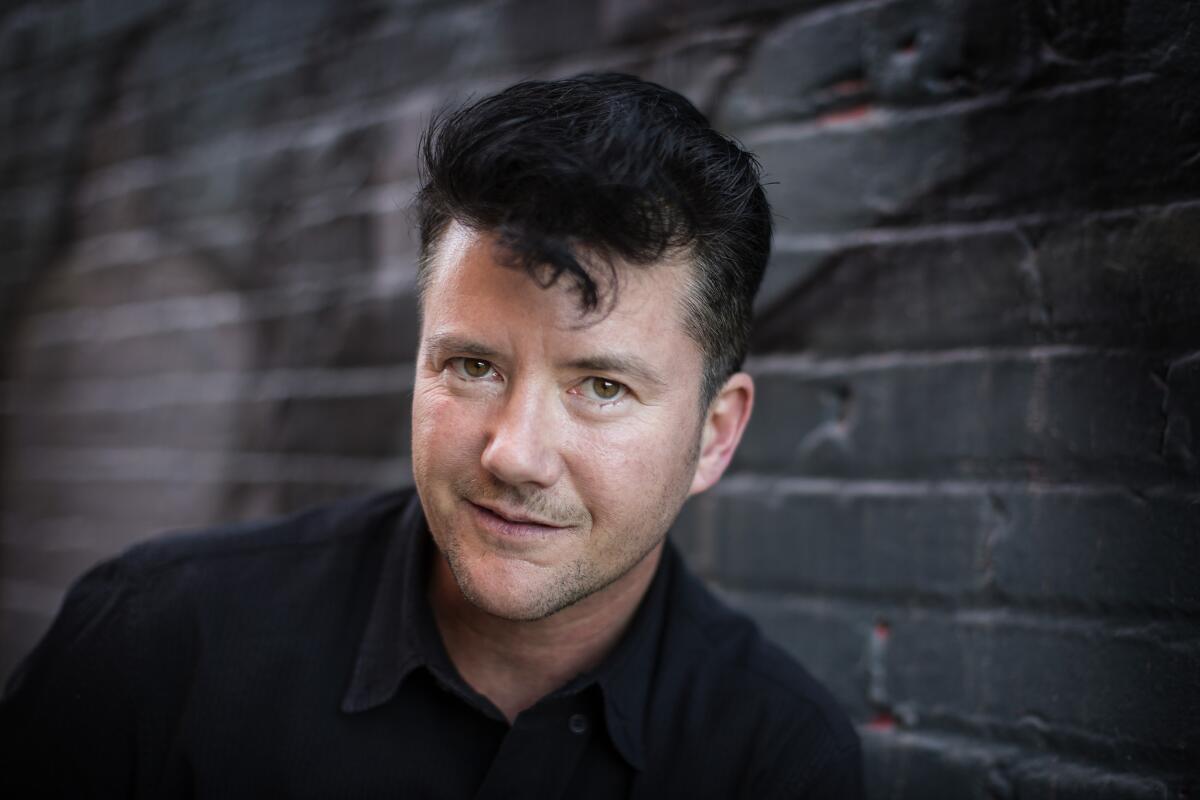A transgender director on ‘Transparent’ is making history of his own

Silas Howard.
Reporting from New York — When he moved to San Francisco shortly after high school, Silas Howard felt alienated. Even though the city in those early 1990s, pre-dot-com days retained a countercultural buzz, Howard, a native of working-class Vermont who self-described at the time as a lesbian, couldn’t seem to find his place.
“I was this super-weirdo fresh off the farm who had barely made it through high school,” Howard says recently over coffee. “I get to San Francisco and there was this gay bar scene I didn’t connect to and this lesbian folk-music scene I didn’t connect to either. Then one day I started seeing these queer punks, and I was like, ‘That’s it, that’s me.’”
Howard went on to become a guitarist and key member of Tribe 8, a band that helped pioneer the gay punk movement known as queercore.
See more of Entertainment’s top stories on Facebook >>
It would not be the first time the artist would swim in new waters and make some entertainment history. Since his Tribe 8 years, Howard has transitioned as a man, and this month can count a different groundbreaking notch on his resume: He is the first transgender director of “Transparent.”
Created by Jill Soloway in part based on her own transgender father, Amazon’s most successful series saw all 10 of its second-season episodes go online Dec. 11.
As with the first go-round, transgender personalities feature heavily behind and in front of the camera. The trans musician and writer Our Lady J again wrote on the show, trans character actors dot the cast and the trans performance artist Zackary Drucker served as a consultant. (Fans of the first season will also recall her as the leader of the support group attended by Jeffrey Tambor’s Maura Pfefferman character.) But until Howard, no trans person had directed a “Transparent” episode.
The issue of diversity in the director’s chair has surged to the fore recently. But even at this critical moment for female and minority directors, trans representation has remained a mostly unopened battlefront. The larger diversity fight is too big and in many ways too diffuse.
Howard’s milestone, then, serves a dual purpose, reminding both of the progress made and the distance left to cover.
Growing up in a poor home as a self-described butch lesbian, Howard was filled with questions about gender and sexuality. Not helping was a lack of support at high school and a complicated maternal relationship. Though Howard says his mother means well and has fundamentally come to accept him, she has sometimes struggled with her progeny’s evolution.
What I connected to in ‘Transparent’ is family. If you’re going through something like this, your family either cuts you off or works through it.
— Director Silas Howard
“What I connected to in ‘Transparent’ is family. If you’re going through something like this, your family either cuts you off or works through it,” he says. “I grew up in a family that was very different from Maura’s, but they had to make the same decisions.”
Howard found common ground with his father, who would eventually move to Key West to become a cab driver after he and Howard’s mother split up. Father and child formed a bond and, despite differences in geography and lifestyle, maintained that into adulthood.
Around the late 2000s, at the same time Howard was transitioning, his father was dying of a terminal illness, medication squelching his appetite. The younger Howard would visit his parent and the two would joke blackly about Howard furnishing his father with the testosterone he had begun taking.
“We would laugh that each of us was transitioning but to very different places,” Howard says, with a dry chuckle. “It helped us cope.”
As Howard began to find his own way with Tribe 8, the musician — he was also known at the time as “Flipper” — tried his hand as an entrepreneur. Despite having no business experience and not much more money, Howard and a few friends opened Red Dora’s Bearded Lady Café, a spot in the Mission District that gained local notoriety as both hangout and performance space for underground artists. Howard would serve as an unofficial ambassador, welcoming both regulars and the ragtag creatives who would wander in.
Howard also began tinkering with film and, with one of the other Bearded Lady proprietors, the trans artist Harry Dodge, shot a low-budget indie called “By Hook or by Crook.” The film centered on a pair of gay friends who set off on a petty crime spree (Howard plays a trans character who moves from a small town to a big city). What the film lacked in polish it made up for in newbie verve, and in 2001 the movie was accepted into Sundance. It was the first piece of entertainment Howard ever shot.
“Silas is the kind of guy who, so many times in our lives,” Dodge says, “would just make me jump off the cliff even if we couldn’t fly and say we would just figure it out on the way down.”
Howard would eventually move to New York and Los Angeles for multi-year stints, in the latter case enrolling in film school at UCLA. (Red Dora’s Bearded Lady, alas, did not make it.) When the first season of “Transparent” was greenlit, he threw his hat in the ring for a directing gig. He didn’t land it, but he made an impression on Soloway and Andrea Sperling, the veteran indie producer who is a key force on the show. When the time came to fill directing slots on the second season, they decided to give Howard a shot.
Meanwhile, his transition was continuing. It was a time, he says, that was both liberating and confusing. “When I began to pass [as a man] it was a little strange. The first time someone at a gas station called me ‘bro’ it was strange,” he says. “A little while ago,” a cousin, noting Howard’s transition and girlfriend “said to me, ‘So are you just a boring straight guy now?’ And I laughed and said, ‘No.’ But I understood why they said that.”
As he sips coffee, Howard, compactly built and with a layer of dark stubble, comes off as gregarious and sensitive, the latter a trait reflected in his “Transparent” episode. The installment, the sixth of the season, finds a key character dealing with a tragedy, and the episode features a degree of empathy that’s notable even by the show’s usual emotional standards.
Dodge says that Howard has empathy as well as a kind of relentless positivity. On the eve of the premiere of “By Hook or by Crook” in San Francisco, Howard had an unusual reaction: He dreamed that Madonna was coming to see the movie. “Everyone involved with the movie is having an anxiety dream before the premiere,” Dodge says. “And he’s dreaming about Madonna.”
For a director who has worked so often on the ultra-indie end of the spectrum, it is no small thing to land on “Transparent.” Howard is part of a list of second-season guest directors that includes the noted British filmmaker Andrea Arnold (“Fish Tank”) and Marielle Heller (who directed the 2015 Sundance smash “The Diary of a Teenage Girl”).
But Howard believes his life experience proved the key part of his resume, allowing him to approach the characters differently than seasoned filmmakers.
“This was a chance to bring my perspective to this show. Matt Damon said that thing about diversity not mattering behind the camera,” he says, referring to the star’s comments on “Project Greenlight,” for which Damon later apologized. “I mean, how could it not matter who’s behind the camera? Directing is all about point of view.”
Howard has several TV and film projects in development and has just finished a round of meetings with executives at companies run by the likes of Harvey Weinstein and Lena Dunham. He is moving back to Los Angeles from New York (he has been teaching at Cornell this semester). He is in a long-term relationship, and his girlfriend, who lives in New York, will be moving with him. (The notion of “transamorousness,” nontrans people who have trans lovers, is covered in his “Transparent” episode.)
Howard also has worked on “Hudson Valley Ballers,” a Web series about a pair of comedy writers produced by Lorne Michaels’ company and starring Paula Pell (who wrote the Tina Fey-Amy Poehler movie “Sisters”). He has developed a project at HBO and finished a short about the San Francisco icon Bambi Lake.
As his stock begins to rise, he can sound conflicted over whether to play down his trans identity or highlight it. If he wasn’t trans, he acknowledges, he well may not have gotten the “Transparent” shot. But he also seems wary of making it a calling card, even downplaying the idea that interactions with the cast were different because he is trans (outside a particularly tight hug from Tambor).
“I did feel an extra burden to do well with my episode, not for myself but because I want to get more people like me behind the camera,” he says. “I feel like it’s not just me being judged.”
Indeed, even with “Transparent” and movies like “Tangerine,” there are few prominent trans directors. The most high-profile, Lana Wachowski, is part of a duo and established herself long before transitioning.
Howard says that the idea of his trans identity going from a potential liability to an outright asset in Hollywood has at times been hard to wrap his head around.
“My storytelling is so queer,” he says. “There’s a lot of money riding on it, a lot riding on it for Amazon. The producers did have to fight [with the studio] to get me on.”
He pauses. “I hope I don’t get in trouble for saying that. But it’s a different language. Some of my work explores characters differently.”
As a trans person who came of age in an earlier era, he says, he is still shaking his head that “Transparent” has become a mainstream phenomenon, let alone that he is a part of it.
His attitude is a reminder that, for all the ways a heteronormative culture has made strides in giving a larger public role to trans people, the trans community has had to make its own calibrations. Compared to the civil-rights and gay-rights movements, the journey from the margins to the mainstream has — thanks to social media and a boost from Caitlyn Jenner — been a comparatively quick one for many of those who experienced it, especially in slow-moving Hollywood.
“It’s weird, surviving your life long enough to sell out,” Howard says with a laugh. “I’ve reached an age when I’m obsessed with that era before representation happened. So much of a shift has happened, but there’s still so much shift left to happen.”
Twitter: @ZeitchikLAT
ALSO:
‘Carl(a)’ a moving, uneven drama about a transgender woman
Review: ‘Transparent’ Season 2
Our Lady J discusses discuses becoming part of the ‘Transparent’ family
More to Read
The complete guide to home viewing
Get Screen Gab for everything about the TV shows and streaming movies everyone’s talking about.
You may occasionally receive promotional content from the Los Angeles Times.







